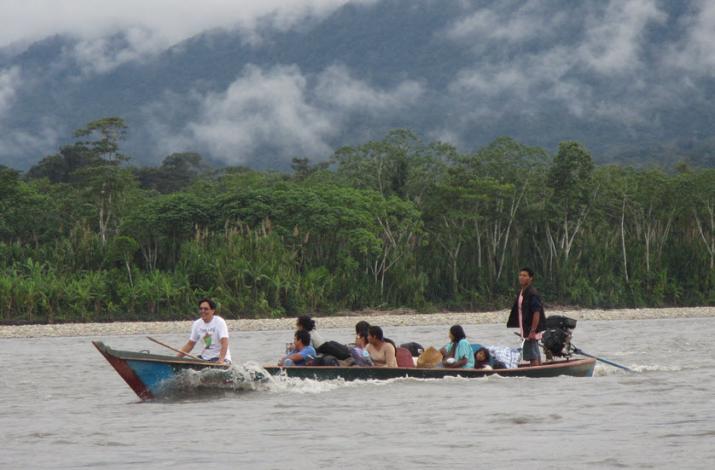
Personnel from the Ministry of Health and Duke fieldworkers returning from Palotoa Teparo with a mother and her sick infant
Published August 18, 2015, last updated on August 19, 2015 under Research News
By guest author Axel Berky, DGHI Associate in Research
Most of the time in the global health research field, a long time has to pass before we see any tangible outcomes in people’s daily lives and health. Years can easily go by between the start of a research project, the fieldwork, the sampling, processing of samples, analyzing the data, writing and publishing until you see the real public health payoff.
But tucked between the high Andean mountains of Cusco and the Southern tropical Peruvian Amazon, Duke researchers—including DGHI’s Bill Pan, Ernesto Ortiz, Caren Weinhouse and Axel Berky—have been making positive impacts beyond the scope of their scientific endeavors.
Surprise: A Hepatitis B Outbreak!
In the remote regions of Madre de Dios, Peru, in the headwaters of the Amazon, this team is conducting an expansive study on human health. Working closely with the local ministry of health, their research has taken them to indigenous communities and mining towns alike to better understand human health, health indicators and environmental factors that may be affecting community health.
The study consists of an array of tests ranging from nutrition, obesity, blood pressure, chronic diseases, infectious diseases and sexually transmitted infections. In several small communities, the researchers have been able to invite everyone to participate in the study, which has had surprising results.
While performing fieldwork in indigenous communities, the Duke team found an alarmingly high number of positive rapid tests for hepatitis B (~17%)—an outbreak previously unknown to Peru’s Ministry of Health. Through their collaborative work with the local Ministry of Health, the researchers promptly shared their results, which has led to several public health interventions.
Thanks to the researchers’ immediate report of the findings, the Ministry of Health was able to perform tests to confirm the reported cases, initiate the appropriate treatment to the confirmed cases and provide vaccinations as well as educational sessions to all the members of the affected communities.
Duke Team Detects Case of Highly Infectious TB
Moving from the dense jungle to the barren apocalyptic landscape of illegal gold mining, the researchers also identified an individual with a highly infectious strain of tuberculosis in a large mining town. Upon receiving the results from the laboratory, the research team reported their finding to the Peruvian Ministry of Health, who arranged for the patient to be treated. The patient’s family and close contacts have also been tested. Luckily, the patient has a good prognosis.
About the Project
Funded by Hunt Oil, this research project includes more than 1,100 households from 23 communities and aspires to broaden the understanding of the current health status as well as health risks in the region and how they vary throughout such a dynamic landscape. While it will still take several months before all of the samples have been processed and analyzed and several more before the findings are published, the team is encouraged to see that their work has already resulted in tangible, positive results.
Learn more about DGHI research in Peru.
While performing fieldwork in indigenous communities, the Duke team found an alarmingly high number of positive rapid tests for hepatitis B—an outbreak previously unknown to Peru’s Ministry of Health.


